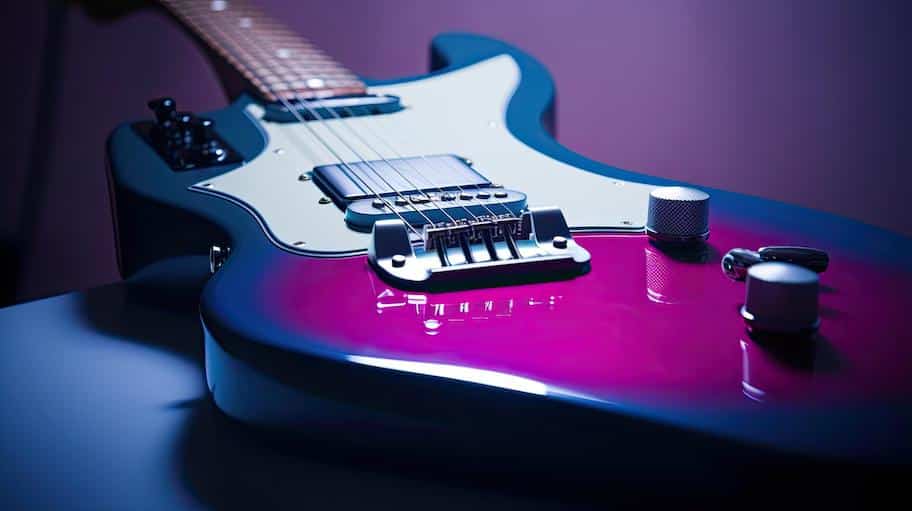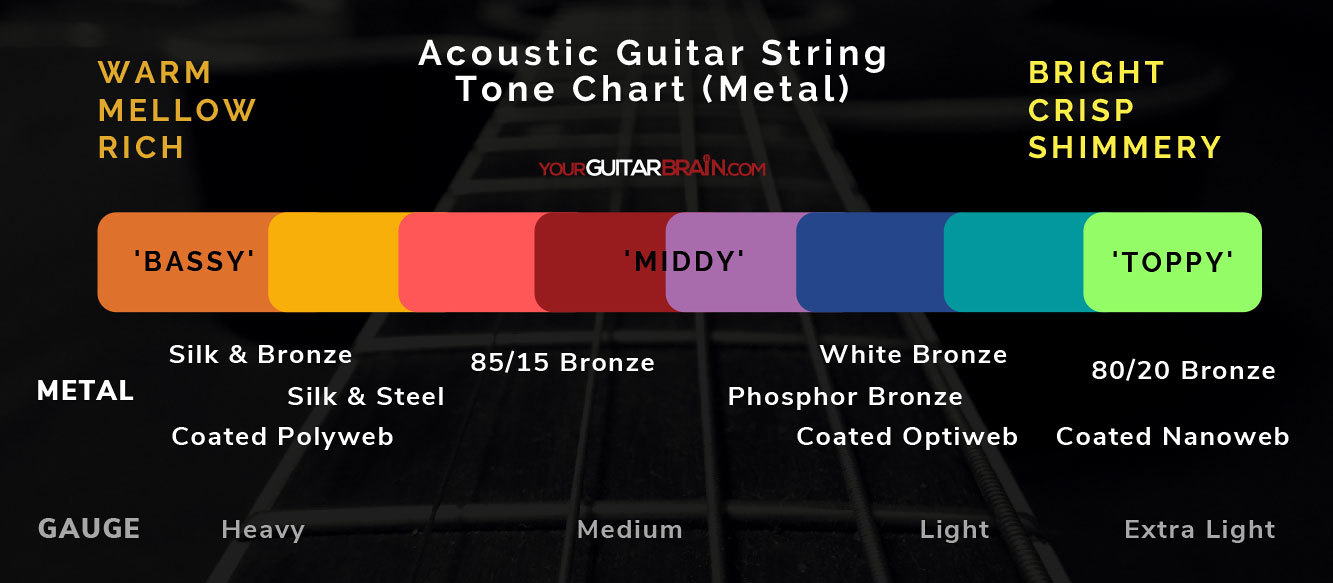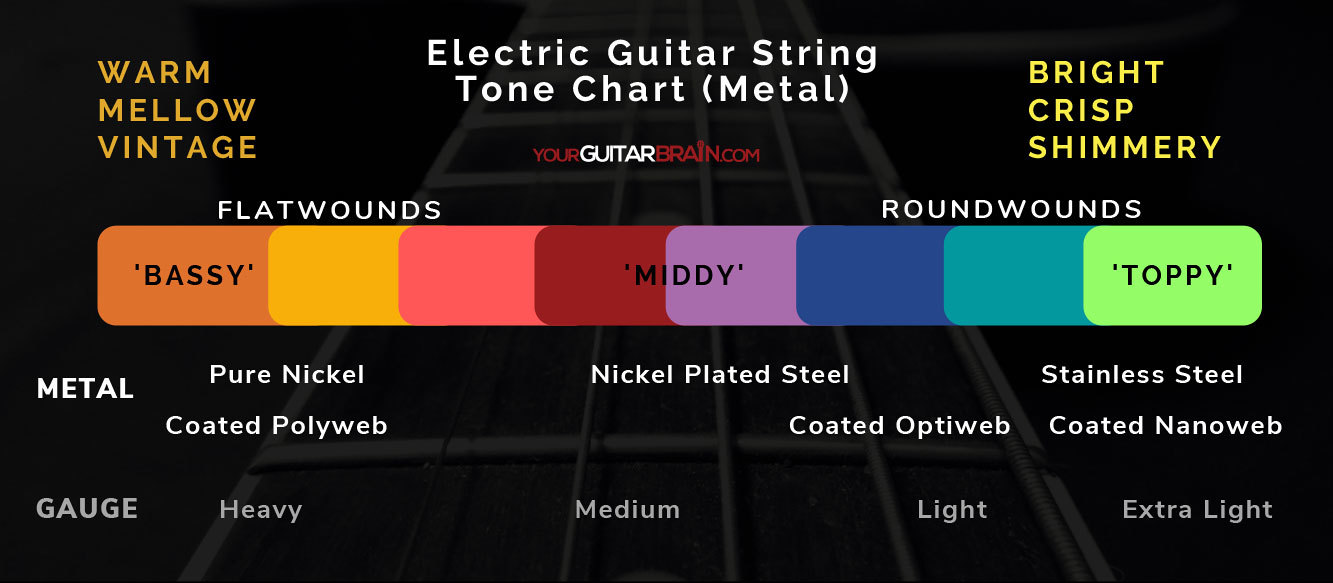How often should you change your guitar strings to avoid sounding dull and boring? We teach you exactly when you need to know…
👉 Are you using the wrong guitar strings? Discover why it’s probably time to switch your acoustic string brand: The Best Acoustic Guitar Strings
Imagine picking up your guitar, ready to play, and realizing that your strings sound dull and lifeless. Or worse, that they’re broken. It’s a frustrating experience, but it’s one that all guitarists have faced at some point.
How often should you change your guitar strings? It’s a question that guitarists have debated for years.
The honest truth is, there’s no one-size-fits-all answer, but there is one tailored to your individual situation. But before we help you find the answer, let’s discuss why it’s crucial to change your strings.
Table of Contents
Why Do Guitar Strings Need Changing?
Changing guitar strings is not the most exciting thing to do as a guitar player. But it is something you should do regularly if you want to enjoy playing your instrument.
Here are the 5 main reasons why you shouldn’t put off changing your acoustic and electric guitar strings:
No. 1 – New Guitar Strings Sound Bright and Clear
One of the main benefits of changing your guitar strings is that they sound better. New strings have a crisp and bright tone that makes your guitar sing.
Old strings, on the other hand, sound dull and muddy. This is because they accumulate dirt, oil, and sweat from your fingers over time.
These substances reduce the vibration and resonance of your strings, making them sound flat and lifeless.
No. 2 – New Guitar Strings Feel Smooth and Comfortable
Another reason to change your guitar strings is that they feel nicer to play. New strings are smooth and shiny, which makes them glide easily under your fingers.
However, old strings are rough and rusty, making them hard and unenjoyable to play.
This can cause discomfort, irritation, and even injury to your fingers. Plus, old strings are more likely to break when you bend or stretch them.
Old strings are rough and rusty, which makes them hard and unenjoyable to play.
No. 3 – Fresh Strings Last Longer and Stay in Tune Better
A third reason to change your guitar strings is that they are more durable and stable. New strings are flexible and elastic, which means they can withstand more tension and pressure.
They also hold their tuning better because they have less friction and resistance. Old strings, on the other hand, are stiff and brittle, which means they are more prone to snapping and slipping out of tune.
Old guitar strings also lose their intonation faster, meaning they sound out of tune even when tuned correctly. Bummer or what?
No. 4 – Fresh Strings Make Your Guitar Look Good
Another reason to change your guitar strings is that they make your guitar look good. New strings are shiny and bright, which adds a touch of sparkle and elegance to your instrument.
However, old strings are dull and dark, making your guitar look old and dirty. Changing your guitar strings regularly can help you maintain the appearance and value of your guitar.
No. 5 – Fresh Strings Improve Your Playing and Learning Experience
Changing your old guitar strings can greatly improve your playing and learning. New strings are more responsive and sensitive, so they pick up all the small details in your playing.
They also make your guitar sound better, helping you spot and fix your mistakes. On the other hand, old strings are less sensitive and can hide your errors.
As we’ve already learned, tired old strings make your guitar sound worse, which means you’re more likely to develop bad habits and play the wrong notes easier.
Regularly swapping out your old guitar strings for fresh ones can make you a better player and a faster learner.

Find Out When YOUR Strings Need Changing
Everyone has an opinion on how often to change guitar strings. Some people suggest changing guitar strings every 50 hours of play or every three months, while others recommend every 100 hours, depending on the type of music played.
But the truth is, there is no one-size-fits-all answer. The frequency with which you need to change your strings depends on a number of factors, including how often you play, how hard you play, and the type of strings you use.
Answer these questions to determine when you need to change your strings:
Question 1. How often do you play your guitar?
The more you play your guitar, the more you need to change your strings. This is because playing wears out your strings, making them sound dull and rough. Here are some general guidelines for different types of players:
- If you play at home for fun, change your strings every 3 months (or 4-5 months if you use high-quality coated strings).
- If you play live or record regularly, change your strings every 1-3 months (depending on how often you play and what kind of strings you use).
Q1 Summary
- Casual players: change your strings every 3 months (or 4-5 months with coated strings).
- Serious players: change your strings every 1-3 months.
Pro Tip
Even if you don’t play your guitar often, you must change your strings periodically. This is because your strings can get dirty and rusty from the oils, sweat on your fingers, and moisture in the air. This can affect the sound and feel of your guitar, as well as its appearance and value.
Question 2. What kind of strings do you use?
The type and quality of your strings also affect how often you need to change them. Different strings have different materials, coatings, and gauges that influence their sound, feel, and durability. Here are some general guidelines for different types of strings:
- If you use acoustic guitar strings, you may need to change them more often than electric guitar strings. This is because acoustic strings are thicker and have more tension, which makes them wear out faster. Acoustic strings also have more contact with the soundboard, which can transfer more dirt and moisture to them.
- If you use electric guitar strings, you may need to change them less often than acoustic guitar strings. This is because electric strings are thinner and have less tension, which makes them last longer. Electric strings also have less contact with the body, which can keep them cleaner and drier.
- If you use coated guitar strings, you may need to change them less often than uncoated guitar strings. This is because coated strings have a thin layer of polymer or metal that protects them from corrosion and dirt. Coated strings can also reduce finger noise and improve tone.
- If you use uncoated guitar strings, you may need to change them more often than coated guitar strings. This is because uncoated strings have no protection from the elements and can get rusty and dirty faster. Uncoated strings can also produce more finger noise and lose tone.
Q2 Summary
- Acoustic players: change your strings more often than electric players.
- Electric players: change your strings less often than acoustic players.
- Coated string users: change your strings less often than uncoated string users.
- Uncoated string users: change your strings more often than coated string users.
Question 3. What kind of tone do you prefer?
The last factor to consider when changing your guitar strings is your personal preference. Different players have different tastes when it comes to the tone of their strings.
Some players like the bright and crisp sound of new strings, while others prefer the warm and mellow sound of old strings. Here are some general guidelines for different types of players:
- If you like the bright and crisp sound of new strings, you may want to change your strings more often than average. This is because new strings have more clarity and sparkle, which can enhance your playing style and genre. New strings can also make your guitar sound louder and more balanced.
- If you like the warm and mellow sound of old strings, you may want to change your strings less often than average. This is because old strings have more depth and richness, which can suit your playing style and genre. Old strings can also make your guitar sound softer and more vintage.
Q3 Summary
- Bright and crisp tone lovers: change your strings more often than average.
- Warm and mellow tone lovers: change your strings less often than average.
Pro Tip
The tone of your strings can also depend on other factors, such as the type of guitar, the type of pickups, the type of amplifier, and the type of effects you use. You may need to experiment with different combinations of these factors to find the tone that suits you best.
Guitar String Types Explained
Various types of string core metals are used on electric and acoustic guitars. Further subcategories reflect how the string was made and what other alloys have been used.
The most common core materials used to make electric strings are stainless steel, nickel and nickel-coated steel.
The most common for acoustics include 80/20 bronze, phosphor bronze, brass, and nylon, with a further subcategory of strings referred to as ‘coated’.
Coated strings such as Elixir Nanoweb Phosphor Bronze strings are made with the same core metals as non-coated strings but with the special addition of a polymer webbing coating.
This coating protects the string metal from finger grime build-up and oxidation, which prolongs the string’s life tenfold.
Acoustic Guitar String Guide
Fig 1.0 Acoustic guitar string tone chart – the sound profile difference between different gauges and materials
80/20 Bronze vs. Phosphor Bronze vs. Silk & Steel vs. Nylon
The strings on a typical acoustic guitar at their core are made from steel, with their outer layer being brass or bronze plated.
80/20 Bronze strings, also called Bronze/Brass, are a mixture of Bronze and Zinc and can sound bright depending on the brand.
Some bronze-plated (particularly “bright bronze”) strings tend to sound less bright than brass strings, with cheaper brands sounding dull after just a few hours of playing.
This means if you have a cheap set of bright bronze strings on your guitar, be prepared to have to change them more often to keep that fresh new string tone and feel.
Phosphor Bronze strings are designed to reduce string corrosion and produce a balanced tone that’s not too bright and not too dull. They are one of the most common string materials you’ll find.
Depending on the brand, you could get a pretty decent amount of playtime from these strings. Expect to get weeks more life from pricier coated phosphor bronze strings, however.
Silk & Steel, also called compound strings, are a mixture of nylon and steel. This combination makes the strings sound more mellow than pure steel strings.
Nylon strings are commonly found on classical guitars and produce a very characteristic smooth and mellow tone suited to specific genres such as classical and folk. Clear nylon is the most common type of nylon string.
Many classical guitars come with the three lower strings wound with metal, such as copper. Known as silver plated strings they’re designed to give more strength and tensility to the bass notes.
The Golden Rules of String Changing
No 1. If an old string snaps on you, it’s telling you something, so never change one – change them all.
No 2. If a new string snaps because you’ve overwound the wrong tuning peg (we’ve all been there) – always replace like for like.
Electric Guitar String Guide
Fig 2.0 Electric guitar string tone chart – the sound profile difference between different gauges and materials
Stainless Steel vs. nickel vs. Nickel Plated Steel
Stainless Steel electric guitar strings are generally brighter and give a more ‘top-end’ tone than nickel strings. Thanks to the bright sound of these strings, they’re a popular string material across many playing styles and genres.
Nickel strings have a mellow to dull sound profile. If you’re looking for a bluesy or jazzy tone, the earthy sound of nickel and nickel-plated will please you no end.
If you go for the plated variety, be prepared to change them more often though, as once the plating wears off, they can become dull and lifeless very fast.
Consider these Thomastik Nickel Flat Wound guitar strings if you’re after a silky-smooth tone – these strings are absolutely perfect for jazz or blues.
Nickel-plated steel gives a sound profile that’s a mixture of the sound of nickel (duller/warmer) and steel (brighter/livelier) core strings.
These strings provide a low-end response and are a little less over-the-top shimmery at first, making them a good choice for many players and genres.
What’s the Difference Between Flatwound and Roundwound Guitar Strings?
The more you read into it, it seems like a guitar string isn’t just a guitar string, doesn’t it?
As well as core material, another variable that affects the lifespan and how often you should change your strings, is how they are made.
Here are some key differences:
Roundwounds | Flatwounds |
|---|---|
| Brighter tone | Mellow warmer tone |
| Don’t last as long | Last longer |
| Cost less | Cost more |
| More fret noise | Less fret noise |
| Longer note sustain | Shorter note sustain |
Pro Tip
Flatwound strings sound warmer and fuller than roundwound strings, making them a great option for taming the overly bright sound of guitars like Telecasters and Strats. Additionally, flatwound strings are less prone to dead skin build-up due to their design.
More Questions to Consider When Choosing the Best Guitar Strings
1. What’s your budget?
I know you’ll agree with this – how much money you have to spend on strings is another important factor that’ll affect how often you can change your guitar strings.
It can be a little disheartening when you read some guy proudly announcing he changes his strings weekly because that isn’t doable for most of us. Changing them this frequently wouldn’t be a hassle, but it would be darn expensive!
2. How much do you sweat?
Gross sounding, I know, but there’s no sugar-coating it; if you sweat more than the average person when you play, you’ll quickly wipe out the lifespan of your strings.
Furthermore, if you’re a working guitar player gigging and recording, I don’t need to tell you how being under those hot lights can make you sweat like a hog roast in July.
So, if you tend to see your strings corrode quicker than the average player, you should go for a higher-grade string that has longer life:
The Best Guitar Strings Recommendations
Whether you’re a beginner or a pro, we have the best electric guitar strings for you. Check out our top picks below.
➡️ Best Acoustic Guitar Strings
Find the best acoustic guitar strings for your sound, budget and playing style with our top recommendations!
Elixir 80/20 Bronze Nanoweb Coating Strings Check it out >>
D’Addario EXP 80/20 Coated Strings Check it out >>
Rotosound NXA10 Nexus Coated Strings Check it out >>
Martin Acoustic Lifespan Strings Check it out >>
Black Diamond Coated Strings Check it out >>
➡️ Best Electric Guitar Strings
Upgrade your electric guitar strings for a brighter sound, longer life, and improved playability!
Elixir Nanoweb Coated Electric Strings Check it out >>
GHS Boomers Electric Strings Check it out >>
Ernie Ball Not Even Slinky Check it out >>
D’Addario Nickel Wound Extra Heavy Check it out >>
Ernie Ball Paradigm Strings Check it out >>
Guitar String FAQ’s
Q1. How do I prolong the life of my guitar strings?
You might have noticed that guitar strings tend to lose their effectiveness over time. But the good news is you can extend their lifespan by regularly cleaning them.
Here are some useful tips to help you keep your guitar strings in great shape for a longer time:
- Wash your hands before playing to remove any dirt and oils that could build up on the strings.
- Clean your strings regularly to prevent them from oxidising from grime and sweat. Day to day, a clean, lint-free cloth is fine, but getting a string cleaner kit is a wise choice.
- Invest in coated strings such as D’Addario EXP26’s, you will get anything over 3 x more lifespan than cheaper non-coated strings.
Q2. Why are my guitar strings breaking so often?
If you’re having trouble with your E string (or any other string) breaking frequently, a few things might be causing the issue.
It could be due to a poorly fitted nut, incorrect playing technique, or using the wrong string gauge.
Check out our article for more information on this topic. We’re here to help! The 8 Actual Reasons Why Your Guitar Strings Are Breaking.
Q3. How Do I Know When My Guitar Strings Need Changing?
Ask yourself the following questions if you’re wondering if you need to change your strings:
- Do your strings sound dull and dead as a doornail?
- Do they look a darker colour with corrosion and grime build-up?
- Do they feel more brittle and hard under your fingers?
- Did you last change them more than four months ago?
- Is your guitar starting to go out of tune quicker?
If you answer yes to only two of the above, it’s time to change those strings buddy.
Q4. How do I change my guitar strings?
Changing your guitar strings is not as hard as it may seem. You just need some basic tools and a bit of patience. Here are the steps to change your guitar strings:
- Remove the old strings by loosening the tuning pegs and cutting or unwinding the strings from the bridge.
- Clean your fretboard and bridge with a cloth and some lemon oil or guitar polish.
- Install the new strings by threading them through the bridge and securing them with pins (for acoustic guitars) or ball ends (for electric guitars).
- Stretch the new strings by gently pulling them away from the fretboard and tuning them up.
- Cut off the excess string ends with a wire cutter or scissors.
For a more detailed guide with pictures and videos, check out our article The 8 ACTUAL Reasons Why Your Guitar Strings Are Breaking (No 6 We’ve All Done).
Summing it Up
Now that you know how to change your guitar strings, you’ll be able to keep your guitar sounding its best for years to come.
Be sure to change your strings regularly, and don’t forget to inspect your guitar for any damage that could be causing your strings to break.
Ta-ra a bit!











